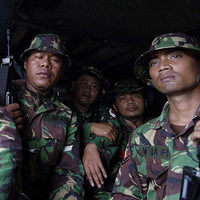DENPASAR, Indonesia -- In the tussle for influence in Southeast Asia, the United States and China have long been competing for Indonesia's affections. The strategically positioned, resource-rich archipelago is a prized partner in an era of fuel shortages and the global war on terror. But Washington and Beijing have lately expanded their courtship of Jakarta from the traditional areas of trade agreements, foreign direct investment, market access and technical assistance, to increasingly include offers of military hardware and military cooperation.
This three-way dance began in 2005, when China and Indonesia announced their "Strategic Partnership." At the same time, the U.S. partly normalized military-to-military ties with Indonesia after an embargo imposed in the 1990s due to the human rights abuses in East Timor by the Indonesian military (TNI).
Beijing took an early lead in this race for influence. The Indonesia-China Strategic Partnership marked a breakthrough in the relationship between the two giant neighbors and sent alarm bells ringing in Washington. The agreement sought to expand the political, cultural and military-security aspects of the bilateral relationship. In terms of the latter, in particular, it committed the two countries to developing each other's defense industries, establishing a defense consultation mechanism, and increasing cooperation between their law enforcement and intelligence agencies in the fight against transnational security threats.

